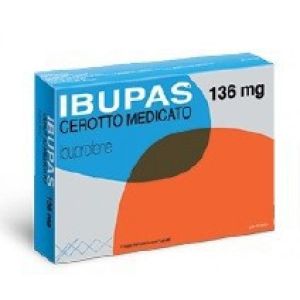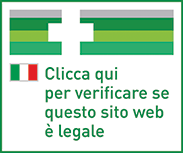Ship in Europe, Find out rates!
Ibupas 136mg Ibuprofen Joint Pain 7 Medicated Patches

- box Delivery in Italy in 24/48 and free returns
- star3.000+ positive reviews
- dropboxOver 60,000 products in the catalog
A medicated plaster contains: active ingredient: ibuprofen 136 mg.
Therapeutic indications
IBUPAS is indicated for the treatment of joint and peri-articular disorders caused by inflammatory and rheumatic diseases (e.g. tendinitis, bursitis, epicondylitis, peri-arthritis) and for the treatment of inflammatory and extra-rheumatic disorders. joints (e.g. fibrositis, myositis).
METHOD OF USE
Use only one medicated plaster at a time and replace it every 24 hours for a period not exceeding 14 days.
IBUPAS is to be used exclusively for applications on intact skin.
It is advisable to wash and dry the painful area carefully before applying the medicated plaster. If the medicated plaster is to be placed on joints subject to wide mobility, such as the elbow or knee, it is recommended to apply it longitudinally and not transversally, taking care to attach the medicated plaster while keeping the joint partially flexed. To apply the medicated plaster, partially detach the two parts of transparent protective film in the central area of the medicated plaster so as to have a free adhesive surface of 2 - 3 centimeters and make this part adhere to the skin of the central area of the painful point. Slowly peel off the two protective films one after the other, taking care to prevent the medicated plaster from creasing or sticking to itself. Immediately after attaching the medicated plaster, lightly massage the skin for about 20 seconds to ensure perfect adhesion of the medicated plaster.
Do not exceed the recommended doses.
Pediatric patients
There is no experience on the use of IBUPAS in children and therefore it is not recommended for use in individuals under the age of 12 years.
Contraindications
Hypersensitivity to the active substance (ibuprofen) or to any of the excipients.
The use of IBUPAS is contraindicated in subjects in whom a previous hypersensitivity to acetylsalicylic acid or to other analgesics or non-steroidal anti-inflammatory drugs has occurred, in patients with previous episodes of bronchospasm, angioedema or anaphylactoid reactions.
The administration of IBUPAS is to be avoided in patients with active peptic ulcer, bronchial asthma or with severe renal and hepatic insufficiency.
The use of IBUPAS should also be avoided in patients with a history of gastrointestinal haemorrhage or perforation related to previous active treatments or a history of recurrent peptic ulcer / haemorrhage (two or more distinct episodes of proven ulceration or bleeding), in therapy with anticoagulants and finally in cases of severe heart failure.
Also avoid applying the medicated plaster on damaged skin or in areas with dermatosis or infections. Avoid contact with eyes and mucous membranes.
The use of IBUPAS is contraindicated in pregnancy and lactation and in children under 12 years.
Special warnings and precautions for use
The plasma levels of ibuprofen achieved after administration of the medicated plaster are much lower than those obtained by systemic administration and therefore the onset of systemic side effects is likely to be very low compared to systemic use.
Non-steroidal analgesics, antipyretics and anti-inflammatory drugs (non-selective NSAIDs and selective COX-2 inhibitors), including ibuprofen, can cause potentially serious hypersensitivity reactions in subjects not previously exposed to this type of drug. These reactions include asthma attacks, skin rashes, allergic rhinitis and anaphylactic-type reactions.
Patients with asthma, with obstructive diseases of the bronchi, allergic rhinitis or inflammation of the nasal mucosa (nasal polyp) react more often than other patients to treatment with NSAIDs, with asthmatic attacks, local inflammation of the skin and mucosa (Quincke's edema) or urticaria .
Use caution when administering IBUPAS to patients with a history of peptic ulcer or gastrointestinal haemorrhage not secondary to NSAID administration and in cases of ulcerative colitis and Crohn's disease. It is also not recommended in case of haemorrhagic diathesis, severe liver or kidney dysfunction and in cases of heart failure.
Caution should be exercised in patients taking concomitant medications that could increase the risk of ulceration or bleeding, such as oral corticosteroids,
anticoagulants such as warfarin, selective serotonin reuptake inhibitors or antiplatelet agents such as aspirin.
Prolonged or repeated use of products for cutaneous use can give rise to local sensitization phenomena. In the presence of hypersensitivity reactions, it is necessary to stop the therapy immediately and consult the doctor in order to establish a suitable therapy.
After a short therapy without appreciable results, consult your doctor.
Caution should be exercised when treating elderly patients who are generally more predisposed to adverse events.
There is no experience on the use of IBUPAS in children and therefore it is not recommended for use in subjects under 12 years of age.
Interactions
The use of ibuprofen patches is unlikely to have interactions with other medicinal products. However, the possibility of competition between absorbed ibuprofen and other drugs with high plasma protein binding cannot be excluded.
Do not use the product together with other drugs for oral or local use containing ibuprofen or other NSAIDs.
Pregnancy and breastfeeding
IBUPAS is contraindicated during pregnancy and lactation.
Use should also be avoided if pregnancy is suspected or if you wish to plan a maternity leave.
Effects on ability to drive and use machines
No studies on the ability to drive and use machines have been performed as IBUPAS is not expected to interfere with these abilities.
| Destination | Cost | Detail |
|---|---|---|
| Italy | €5,90* | 24/72H |
| Austria, France, Germany, Slovenia | € 13* | 3 days |
| Belgium, Luxembourg, Portugal, Netherlands, Spain | € 14* | 4 days |
| Bulgary, Cechia, Hungary, Poland, Romania, Slovakia | € 19* | 5 days |
| Denmark, Estonia, Finland, Ireland, Lithuania, Latvia ,Sweden | € 22* | 5 days |
| United Kingdom, Switzerland, Greece, Malta/td> | € 30* | 7 days |
| Canada | € 40 | 7 Days |
European shipments with express courier: FedEx, MBE, DHL
*For the shipment outside band B ther's an extra cost of 22€ *For the shipment outside band C ther's an extra cost of 30€ Delivery Times exclude Saturday and Holidays
For Islands and Areas of difficult Accessibility the shipments are made in 72 hours and the cost will be increased by 15€


